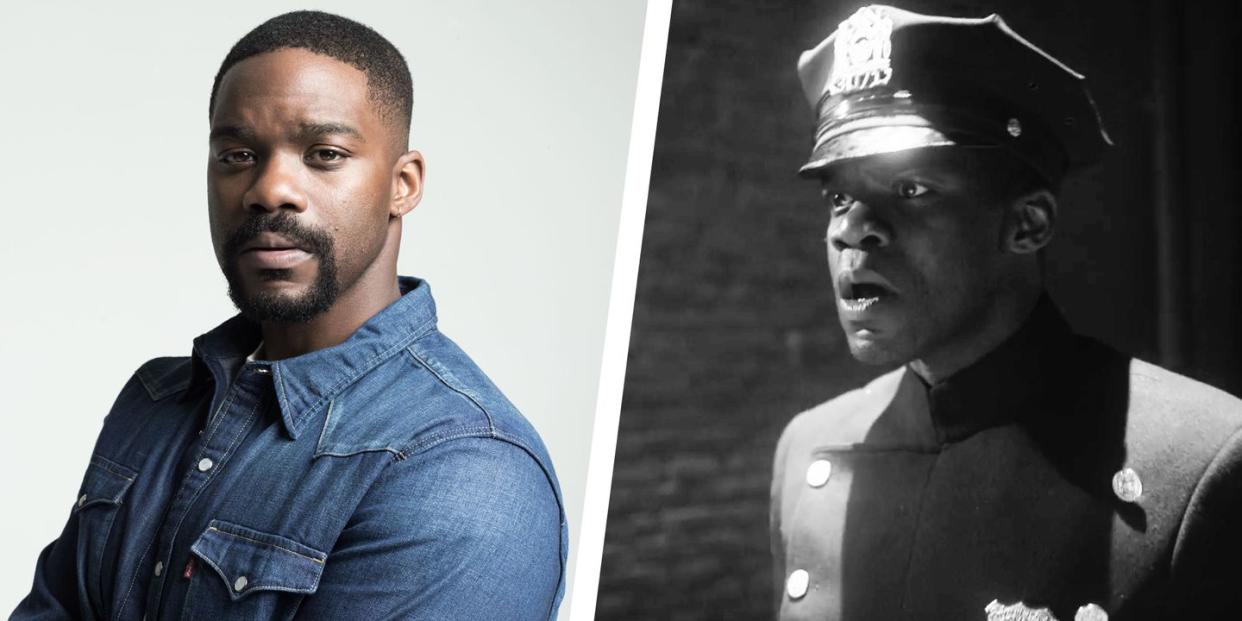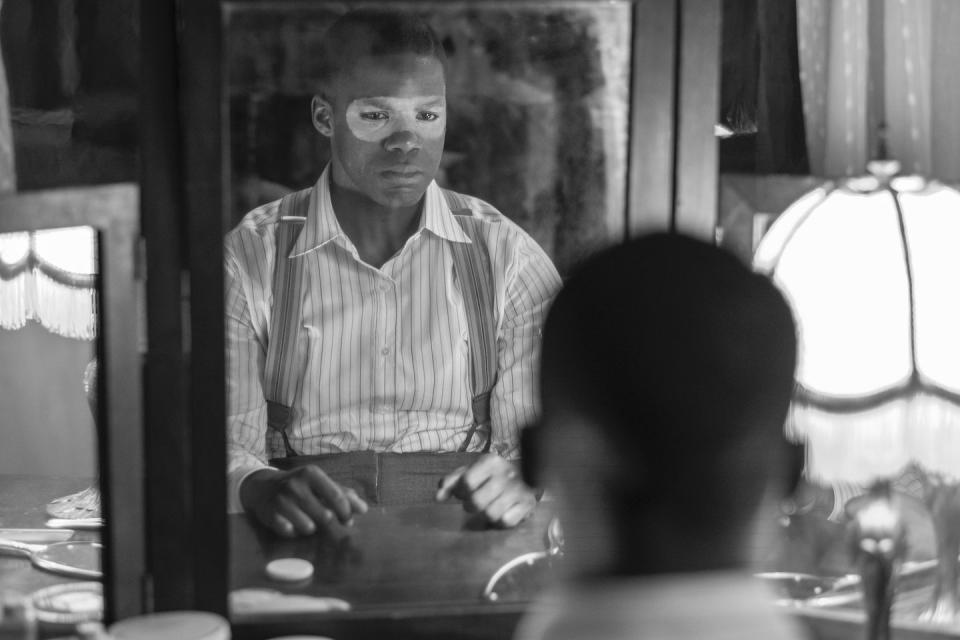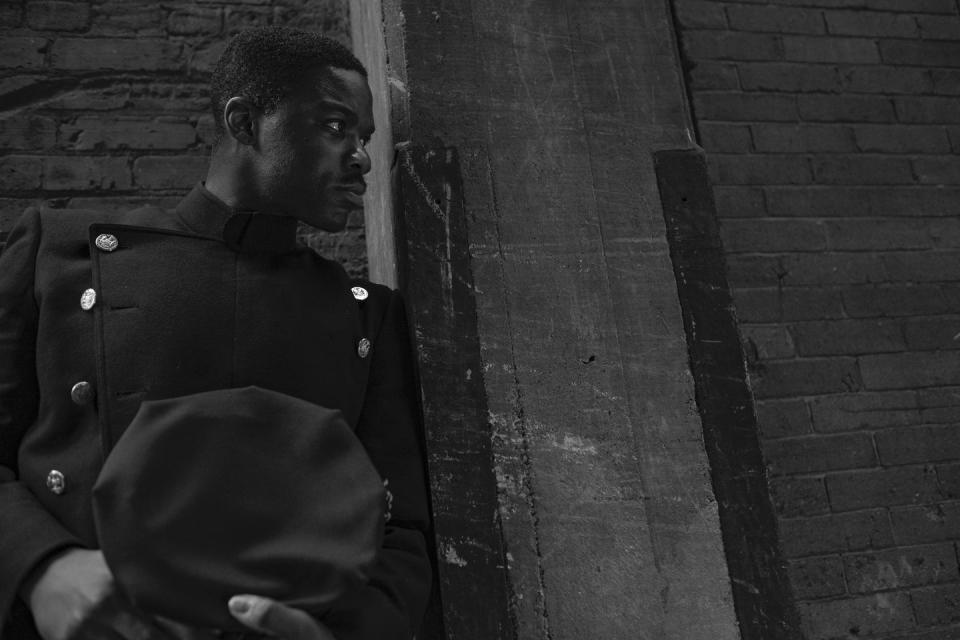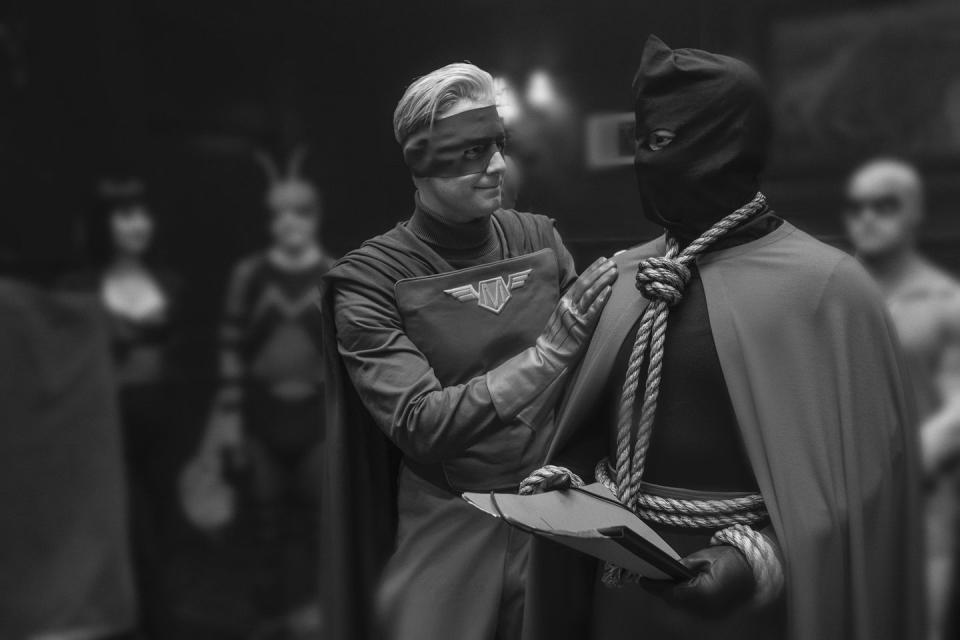How Surprise ‘Watchmen’ Star Jovan Adepo Became Hooded Justice

Spoiler warning: the following story includes spoilers for the sixth episode of HBO's Watchmen. Stop reading here if you haven't watched yet. Seriously!
This whole acting thing is hardly new for Jovan Adepo, who in the past few years has starred in movies like Fences (with Denzel Washington), and on shows like The Leftovers (under Watchmen showrunner Damon Lindelof), but there's still a palpable excitement in his voice as he discusses his own Watchmen role. As the young version of Will Reeves, the 105-year-old mystery man—revealed, finally, to be Hooded Justice—Adepo intensely fills in some of the formative middle years of the person we've seen as both an extremely young boy, and an extremely old man. The show's sixth episode, "An Extraordinary Being," pushes Will's backstory front and center, depicting the dark past and uncomfortable present of our country's relationship with racism.
Throughout our conversation, the 31-year-old actor repeatedly described what, exactly, makes Watchmen the right place to tell stories about race, crime-fighting, and the intertwining of the two: despite the universe's presence of people in masks fighting crime, it's incredibly grounded—honest to the truth of how society functions, both in 1938, and in present day.
"It's not about him being a guy who puts on pajamas and a cape, and runs around punching people," he says about Will, for whom the episode serves as something of a pragmatic origin story. "It's about a guy who's dealing with so many moments of tragedy, and trauma in his life, and dealing with it outwardly, but in a way that he feels is the best thing to do to balance out the world that he's living in. He's living in a place where he's not able to be comfortably black, or freely black, without fear of getting his ass kicked, because the white folks in New York hate him."
After weeks of hinting and winking to comic-readers, Watchmen used its sixth episode to finally reveal something that many had theorized: in his youth, Will was Hooded Justice, the first "superhero" this world ever saw. As Angela Abar (Regina King) took all of the memory-storing Nostalgia pills Will left her, she got a first-hand view into his life and experiences that included a plethora of harrowing scenes depicting deep-rooted violence, prejudice, and racism.

The most disturbing of those moments comes in the first half of the episode, when Will attempts to arrest a white man for an act of arson he witnessed first-hand. His colleagues, in turn, let the man go. They eventually jump Will, tie a rope around his neck, and nearly lynch him; the camera shifts to Will's perspective, as we hear frenzied breathing and see the world through fading, sack-cut eyeholes, before he's cut down and called a racial slur.
In Lindelof, Cord Jefferson, and director Stephen Williams, Adepo says he had the first thing you need when filming scenes of this nature: trust. "I can definitely say, from day 1, as soon as I agreed to do the part, and I got to the production office, I could just tell that I was going to be in good hands," he says, adding that Williams specifically asked for help in making sure the scene was "raw" and would "make viewers uncomfortable."
Tact and care are necessary in filming these scenes as well—the things depicted aren't only traumatic, but pieces of history; the police brutality, the lynchings, the Tulsa Riots—these things all actually happened. Adepo is hesitant to describe his exact process in scenes like the attempted lynching, because "especially mentally, it can be a bit uncomfortable trying to shake it off."
Will, at this point, clearly shaken from the disturbing encounter, sees a mugging in an alley and acts fast. He puts the sack back on his head, and jumps into action—saving the couple being mugged and incapacitating the attacker. This is where Hooded Justice is born.
Adepo has an idea of what led Will to step in, walking home from his own near-lynching with the noose still around his neck. "He was thinking, 'I can't escape this. The world is just dirty, and unfair, and I don't want to feel this way again—I don't want anybody else to feel the pain that I'm feeling if I'm able to help stop it. And the best way I can do that shit is putting on a mask, covering my face, and go take some names, and go do something about it.'"

Having already worked with Lindelof on The Leftovers, Adepo never expected to be involved with Watchmen; after all, it's an understood rule of the former LOST showrunner's that he doesn't use the same actors in more than one project—a rule he admitted to breaking when he cast Regina King (who also appeared in The Leftovers).
It was only later, when Lindelof called him and told him about the role in Episode 6, that Adepo had any idea that the mythicized rule was being broken for him, too. "Literally, talking to him on the phone, and talking to him about what Hooded Justice's costume looks like, and stuff... in the back of my mind, I was like...is he really about to cast me again? I thought that was a rule that he enforced that he didn't do," Adepo says. "And I was kind of too scared to ever ask him."
King and Adepo built a relationship on The Leftovers playing mother and son—here, they play the same character, switching off sometimes on a frame-by-frame basis. As the episode is constructed in aBirdman-esque manner, appearing mostly as a continuous shot, the performers were required to switch out of one another's spots sometimes with only seconds to spare.
This meant pre-scene huddles, discussing everything from Will putting his hand on his head when he's pissed off, and twinkling his eye when he's nervous, to the pre-scene preparation for that gut-wrenching lynching scene.
Adepo describes a process that included the pair talking one another through it. "When it was time for game day, and it was time to jump into it, it was like 'Okay! I love you.' 'I love you too.' Hug it out, and then it's time to go to work," he said. "And I'm going to go as far as she's going to go, or try my best to keep up, because this is not the type of material that you're going to half-ass. You've got to commit to it."
One thing that American Hero Story, the goofy show-within-a-show that we've seen clips of throughout the season, did get right, though, was a certain piece of HJ's backstory: his sexuality. As we see in Will's flashback/memory, while he feels a love for his wife, there's also a piece of him that's at the very least curious to explore a relationship with Nelson/Captain Metropolis, a new and interesting figure that enters his life.

Adepo notes that there's an empty space—a "rough patch"—that we don't see in Will's life, between his time as a child stranded in the corn field following the Tulsa riots, and when we find him becoming a police officer in New York. He notes that while we don't know what happened in that period, what we see in the episode with Captain Metropolis is clearly diving into a new piece of himself that he's not delved into at a legitimate level before. "At the end of the day, he's a man who loves who he loves," he says. "I absolutely, genuinely believe that he loves June as well. But I think he has a strong sexual desire that he's always wanted to explore."
While Watchmen exists in a grounded world—keep in mind that no one has superpowers aside from Dr. Manhattan—it's still a major comic book property nonetheless, and its featuring of a non-straight superhero comes at an incredibly tender time for such a thing. While Marvel has hinted at LGBTQ+ representation in future movies, it's yet to come up in a truly meaningful way on-screen; DC's universe has been the same way.
Which is why it's such a big development to see Hooded Justice, revealed to be both the original masked crimefighter in this world, and, really, the protagonist of the whole story, representing a group of people who've never really been able to see themselves on-screen in a piece of art like this before.
"I think it's pretty cool for people who love superheroes, and who love properties like Marvel and DC, and all the other ones that come about," Adepo says. "There are people out there who probably feel misrepresented, and feel that they're not seen, or feel like they don't have characters that they can relate to."
"We all experience the same things; the degrees of those life events may vary, but at it's core, it's just people trying to be accepted, and being able to live in their own skin without fear of being judged or being hurt, and that's a story that I will always be happy, and be proud, to step into and portray for someone to connect to."
You Might Also Like

